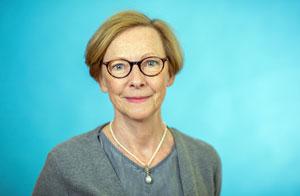You are here
‘Side by side’ with the Kingdom, Germany announces ‘record’ 729.4m euros in support
By JT - Oct 07,2019 - Last updated at Oct 07,2019

Birgitta Maria Siefker-Eberle
AMMAN — Germany, the second-largest bilateral donor to Jordan, will hold talks this week to provide a record volume of 729.4 million euros in support to the Kingdom, German Ambassador to Jordan Birgitta Maria Siefker-Eberle said on Monday.
The ambassador stated that the total includes 400 million euros for budget support, water and education. In addition, Germany will offer 100 million euros of humanitarian aid and further support in the military and security field, she added during an interview with The Jordan Times on the occasion of Germany’s national day, which she said the German embassy will mark on Tuesday.
“You can clearly see that there is no donor fatigue on our side,” she said.
Since 2012, the German Government has supported the Government of Jordan in dealing with the enormous challenges related to the influx of Syrian refugees. It has “considerably increased” support to more than half a billion euros of annual funding, the envoy said.
“We think that Jordan is accomplishing extraordinary results in a conflict-ridden region and has been shouldering a great humanitarian responsibility,” Siefker-Eberle added.
Touching on “stronger than ever” relations of 66 years, the ambassador said: “We view Jordan as a close partner, as a voice of reason in a troubled region.”
Pointing to the high priority both sides attach to their relations, she highlighted the recent number of “high-ranking” bilateral visits, including His Majesty King Abdullah’s recent visit to Berlin, where he held talks with President Steinmeier and Chancellor Merkel ahead of the UN General Assembly and the German president’s 2018 visit to the Kingdom with Merkel.
Touching on cooperation in a wide spectrum of fields, the Ambassador highlighted ties in the security sector, especially in the fight against the Daesh terror group and violent extremism.
Further elaborating on ties, she mentioned cooperation in civil defense to establish volunteer-based disaster response structures and enhance capacities to deal with disasters.
“In the cultural field we have our Goethe Institute in Amman that is also offering high quality German language classes. And then there is of course the flagship project of our educational policy: The German-Jordanian University that is now entering its 14th year and has managed to rise to the top in all rankings,” she said.
Germany, she added, has contributed to archaeological field work in the northern region, especially in and around Umm Qays.
“The largest part of our support though is in the field of development cooperation. This year is a very special one since we celebrate 60 years of German-Jordanian development cooperation. Throughout the year we have marked this anniversary in various events, with a big celebration coming up on October 12,” Siefker-Eberle said.
She traced the history of development cooperation between the nations to 1959.
“Ever since,” she continued, “our countries have worked intensively together to promote sustainable development in Jordan — and have achieved significant results in the area of water and wastewater, education, employment promotion, environmental protection and solid waste management.”
2.8 million people in Jordan now have improved access to water after the implementation of projects funded by the German government, she elaborated.
“Another example is cash-for-work opportunities for vulnerable Jordanian citizens as well as Syrian refugees, targeting 50 per cent Jordanians and 50 per cent Syrians,” she said, adding, “these projects improve infrastructure focusing on maintenance and cleaning of roads and highways as well as municipal work.”
Regarding employment, she noted that a challenge for the future is to focus on more sustainable and long-term solutions.
Most projects are being implemented by Deutsche Gesellschaft fuer Internationale Zusammenarbeit (GIZ), KfW Development Bank and the Federal Institute for Geosciences and Natural Resources (BGR) as well as international and local institutions, she added.
With regard to the Middle East Peace Process, the ambassador said, Germany “clearly supports a two-state solution”.
“For us, this is the prerequisite for peaceful coexistence. It presents the best way to meet Israeli and Palestinian needs and aspirations. We must not let up in working towards this goal to achieve lasting peace,” she stressed.
She referenced the current times, “when key principles of international order and essential instruments of international cooperation are challenged”.
“To counter this trend, in April 2019, the French and German Foreign Ministers launched the ‘Alliance for Multilateralism’, bringing together those who believe that strong and effective multilateral cooperation, based on the purposes and principles of the Charter of the United Nations, international law and justice, are indispensable foundations to secure peace, stability and prosperity,” she said.
Two weeks ago, the ambassador explained, during the UN General Assembly, Germany and France alongside Canada, Mexico, Chile, Singapore and Ghana organised an “Alliance for Multilateralism” event, which saw the participation of more than 50 Foreign Ministers, among them Jordan’s Foreign Minister Ayman Safadi.
“We are thus standing side by side.”
Related Articles
AMMAN — German Ambassador to Jordan Birgitta Maria Siefker-Eberle on Monday said that her government will hold talks this week to provide a
AMMAN — The German embassy in Amman on Tuesday celebrated German unity and 30 years since the fall of the Berlin Wall with a reception for i
AMMAN — Germany’s Ambassador to Jordan Birgitta Siefker-Eberle on Wednesday visited the German-Jordanian University, where the ambassador me











